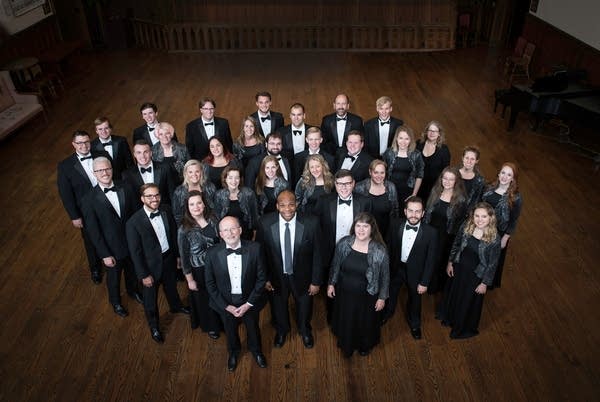Minnesota artists brace for federal funding cuts

Theater professionals plan to gather in Minneapolis Monday morning to talk about the National Endowment for the Arts and its impact on their work.
President Trump has proposed eliminating the NEA, along with other cultural programs, as part of his federal budget.
"It's not enough to say 'No, please don't cut this funding' — we have to be very vocal about why it's important," said Paul Coate, an actor and singer who helped organize the meeting at Mixed Blood Theatre. He said his goal is to raise awareness of just how important the National Endowment for the Arts is to Minnesota's cultural scene.
Coate admits that as an actor, he's often not aware of where the funding for a production is coming from. So he did a little research.
Create a More Connected Minnesota
MPR News is your trusted resource for the news you need. With your support, MPR News brings accessible, courageous journalism and authentic conversation to everyone - free of paywalls and barriers. Your gift makes a difference.
"In reviewing the recent NEA grants awarded to theaters in the Twin Cities, I discovered that not one but two of my large performance projects this year — two gigs, two of my big gigs — are indeed partially funded by the NEA," he said.
The potential loss of funding, said Sheila Smith, executive director of Minnesota Citizens for the Arts, is "a huge deal in Minnesota," which stands to lose more money than most other states.
"Minnesota benefits to a greater degree from NEA funding than other places, because a lot of it is competitive," she said. "And we have a lot of really good organizations that apply to the NEA and are successful in bringing grants to Minnesota."
Minnesota receives approximately $5.6 million in NEA funding each year, according to Smith. Much of it is used to seed new projects or programs.
Getting an NEA grant carries a lot of weight. Arts organizations are able to use it to leverage more money from foundations and other donors.
One of the largest beneficiaries of NEA funding in Minnesota is Arts Midwest. President David Fraher said he worries about what would happen to the cultural infrastructure of the country if NEA funding were to go away:

"Smaller companies would disappear, smaller experiences would disappear, community-based programming would probably disappear or would be severely impaired, and people living out in rural Minnesota would have a much harder time accessing programming."
Arts Midwest works to move art around the state and region by funding tours of exhibitions, plays and musical programs. It also runs two national programs for the NEA. The "Shakespeare in American Communities" program brings theater into classrooms and gets students into theaters to see live productions, including Guthrie Theater's recent production of "King Lear."
"The Big Read," a community reading program, serves 75 different towns across the country each year.
Recently, "The Big Read" hosted an event in Shakopee, Minn., during which the community read Tim O'Brien's book 'The Things They Carried'. The initiative included "huge amounts of outreach to veterans, talking about what it really means to be a vet. So it was about a) literature, but b) really strong community-building projects," Fraher said.
Both of these national programs would disappear without the NEA.
For some Minnesotans, the elimination of NEA funding has the potential to deal multiple blows.
Anna George Meek is a poet, singer and teacher. She lives in Minneapolis with her husband and daughter.
"I received an individual artist fellowship several years ago for $25,000, which was an incredible boon to us," she said. It "literally paid for the mortgage and groceries for us at that time."
Meek's primary income comes from teaching, but she supplements that money singing in the group VocalEssence, and with the occasional checks she gets for her several volumes of published poetry. But it's not just about the money; the NEA also funds much of the culture she consumes.

"I was trying to parse this out with my husband," she said. "We were trying to name all the different ways in which the NEA enters our lives. Whether it's going to the SPCO, or getting a paycheck from VocalEssence, or buying books from Graywolf ... my community, it creates my community! It's the places I go, it's literally the food I eat."
None of the people interviewed for this story believe that the National Endowment for the Arts will be eliminated in the next federal budget. There's strong bipartisan support for the NEA in Congress, and it's Congress that makes the final budget decisions, not the White House, noted David Fraher.
"I have great confidence in the process," he said. "I think that the majority of the members of Congress actually sit and think about what's going to be beneficial for the people in their district. And when push comes to shove, they'll support the endowment."
Fraher may be right, but the possibilities are making artists nervous.
"The reality is that if elimination is a proposal, cuts are incredibly likely, at least," said Paul Coate. "And cuts themselves are damaging."
Either way, many artists and arts organizations are bracing themselves for a blow.
Correction (April 24, 2017): An earlier version of this story incorrectly reported the location for a "The Big Read" event.